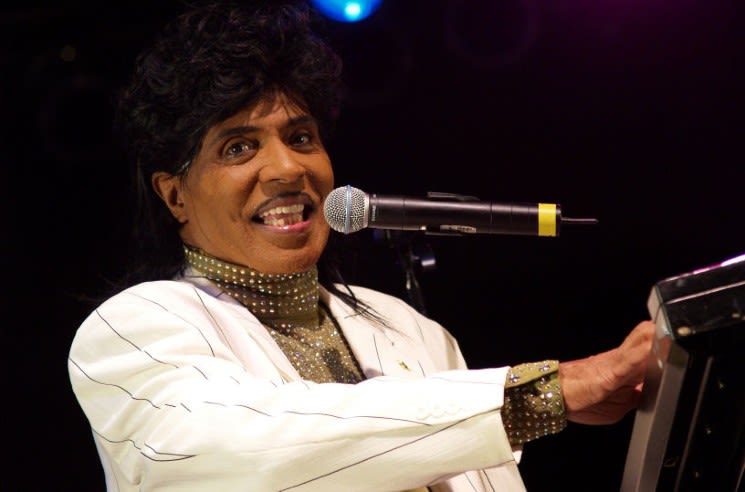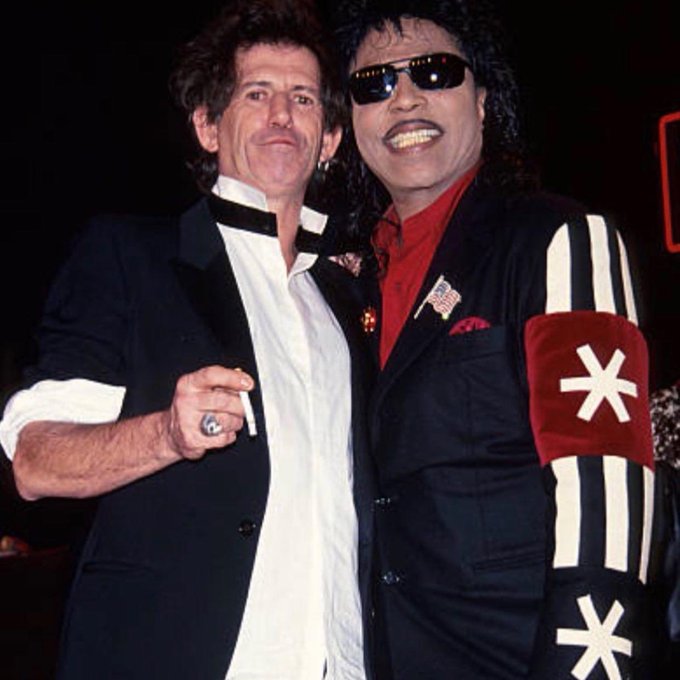Rock'n'roll icon Little Richard has died at 87.
The musician behind hits including "Tutti Frutti," "Long Tall Sally" and "Good Golly Miss Molly" was reported dead by his son, Danny Penniman. Richard passed away early this morning following a battle with bone cancer.
Little Richard was born Richard Wayne Penniman on December 5, 1932, in Macon, GA. He sang in a variety of churches from a young age, and, at age 14, was discovered by Sister Rosetta Tharpe, who invited him to open for her at a show at the Macon City Auditorium.
Discouraged by his religious family from singing R&B, considered "devil music," Richard left home in 1949 to work as a touring performer, occasionally performing in drag as Princess LaVonne and developing his flamboyant performance style. Following a series of short-term recording contracts, he earned acclaim in 1955 on Specialty Records with his single "Tutti Frutti," which hit No. 2 on the Billboard R&B charts, shortly followed by "Long Tall Sally" in 1956. Little Richard's live shows were noted for encouraging racially integrated audiences, a rarity at that time.
His success waned with the release of his first two albums, Here's Little Richard in 1957 and the non-charting Little Richard in 1958. He decided to leave the music industry and joined the ministry, studying theology at Oakwood College in Alabama and becoming a travelling preacher and a gospel artist for Mercury Records.
Richard returned to secular music in the early in 1960s and performed alongside the new wave of rock'n'roll acts his music helped pioneer, including the Beatles and the Rolling Stones. Jimi Hendrix was a member of Little Richard's band, the Upsetters, in 1964 and 1965.
But the decade also found Little Richard struggling, unable to connect with conservative Black listeners due to his flamboyant appearance, and his insistence on performing to integrated audiences alienated supporters of burgeoning Black liberation movements in the wake of the Watts riots and the formation of the Black Panthers.
In the late 1960s, Little Richard experienced a resurgence in popularity after dialling up his flamboyant on-stage persona, as influenced by the rise of Hendrix. A series of notable live and TV performances, including a residency in Las Vegas, led to TV talk show appearances and the release of 1970 album The Rill Thing on Reprise, with "Freedom Blues" becoming his highest-charting single in years.
A series of poorly received live performances in the early '70s, followed by voice problems caused by drug addiction and alcoholism, led to Little Richard leaving rock'n'roll for gospel music again. A 1984 lawsuit against Specialty Records for unpaid royalties was settled out of court in 1986.
Little Richard returned to rock'n'roll again in 1986 following the success of his authorized biography, Quasar of Rock, but this time he reconciled his religious leanings with his rock music inclinations. Christian rock single "Great Gosh A'Mighty," a contribution to the film Down and Out in Beverly Hills in which Richard also starred, found success on the charts, and Little Richard continued to act and perform to acclaim.
In his later career, he collaborated with U2, B.B. King, Elton John and Jon Bon Jovi, and performed the theme song to children's TV show The Magic School Bus.
Since his death, he's been remembered by many, including Ringo Starr, Quincy Jones, Keith Richards and Michelle Obama. Scroll through select tributes below.
The musician behind hits including "Tutti Frutti," "Long Tall Sally" and "Good Golly Miss Molly" was reported dead by his son, Danny Penniman. Richard passed away early this morning following a battle with bone cancer.
Little Richard was born Richard Wayne Penniman on December 5, 1932, in Macon, GA. He sang in a variety of churches from a young age, and, at age 14, was discovered by Sister Rosetta Tharpe, who invited him to open for her at a show at the Macon City Auditorium.
Discouraged by his religious family from singing R&B, considered "devil music," Richard left home in 1949 to work as a touring performer, occasionally performing in drag as Princess LaVonne and developing his flamboyant performance style. Following a series of short-term recording contracts, he earned acclaim in 1955 on Specialty Records with his single "Tutti Frutti," which hit No. 2 on the Billboard R&B charts, shortly followed by "Long Tall Sally" in 1956. Little Richard's live shows were noted for encouraging racially integrated audiences, a rarity at that time.
His success waned with the release of his first two albums, Here's Little Richard in 1957 and the non-charting Little Richard in 1958. He decided to leave the music industry and joined the ministry, studying theology at Oakwood College in Alabama and becoming a travelling preacher and a gospel artist for Mercury Records.
Richard returned to secular music in the early in 1960s and performed alongside the new wave of rock'n'roll acts his music helped pioneer, including the Beatles and the Rolling Stones. Jimi Hendrix was a member of Little Richard's band, the Upsetters, in 1964 and 1965.
But the decade also found Little Richard struggling, unable to connect with conservative Black listeners due to his flamboyant appearance, and his insistence on performing to integrated audiences alienated supporters of burgeoning Black liberation movements in the wake of the Watts riots and the formation of the Black Panthers.
In the late 1960s, Little Richard experienced a resurgence in popularity after dialling up his flamboyant on-stage persona, as influenced by the rise of Hendrix. A series of notable live and TV performances, including a residency in Las Vegas, led to TV talk show appearances and the release of 1970 album The Rill Thing on Reprise, with "Freedom Blues" becoming his highest-charting single in years.
A series of poorly received live performances in the early '70s, followed by voice problems caused by drug addiction and alcoholism, led to Little Richard leaving rock'n'roll for gospel music again. A 1984 lawsuit against Specialty Records for unpaid royalties was settled out of court in 1986.
Little Richard returned to rock'n'roll again in 1986 following the success of his authorized biography, Quasar of Rock, but this time he reconciled his religious leanings with his rock music inclinations. Christian rock single "Great Gosh A'Mighty," a contribution to the film Down and Out in Beverly Hills in which Richard also starred, found success on the charts, and Little Richard continued to act and perform to acclaim.
In his later career, he collaborated with U2, B.B. King, Elton John and Jon Bon Jovi, and performed the theme song to children's TV show The Magic School Bus.
Since his death, he's been remembered by many, including Ringo Starr, Quincy Jones, Keith Richards and Michelle Obama. Scroll through select tributes below.
God bless little Richard one of my all-time musical heroes. Peace and love to all his family. 😎✌️🌟❤️🎵🎶💕☮️
So sad to hear that my old friend Little Richard has passed. There will never be another!!! He was the true spirit of Rock’n Roll!
Tweet not found
The embedded tweet could not be found…








